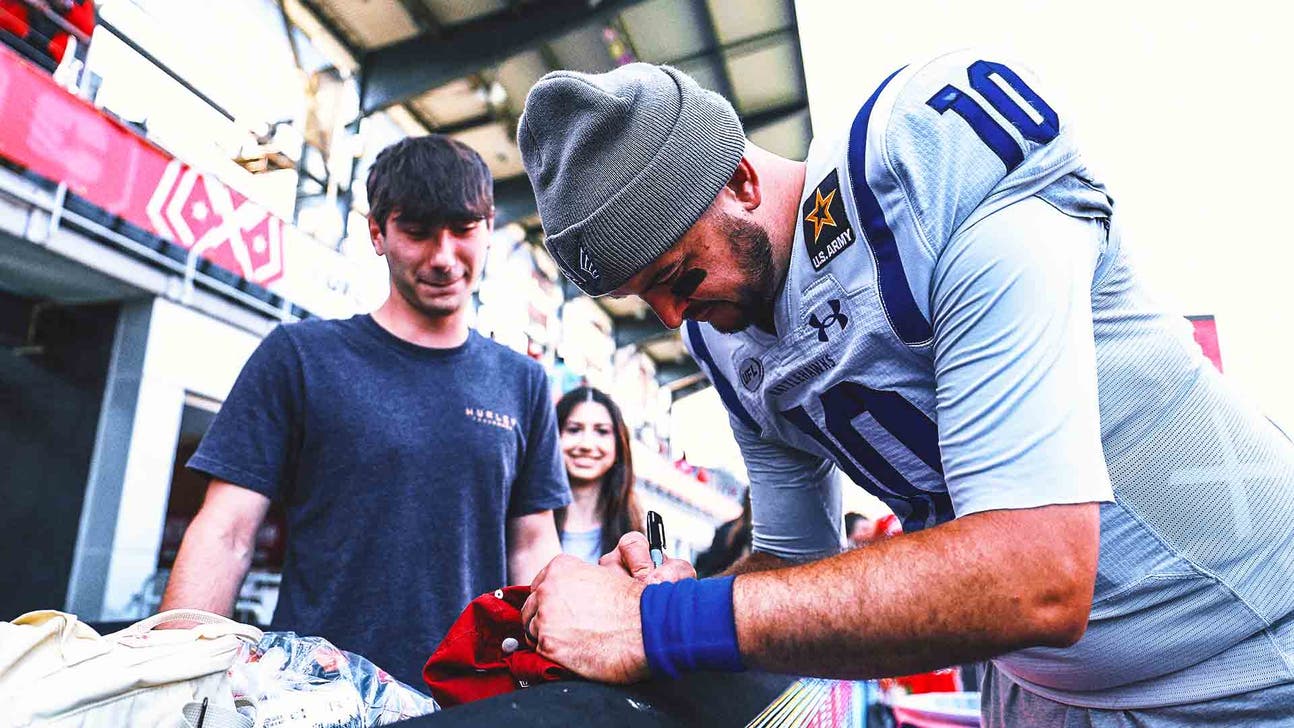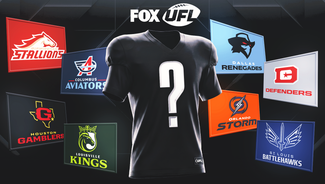
UFL midseason review: Innovative rules, exciting finishes have kept fans tuned in
Through the first half of its inaugural season, the UFL's numbers are an unqualified success.
Its 18 UFL telecasts averaged 845,000 viewers. Viewership for the league is up 25% compared to last year for both the USFL and XFL. More than 250,000 fans have attended games that are much more entertaining due to innovative rules that have led to 94.5% of kickoffs being returned, as well as a series of late-game comebacks.
In an exclusive interview with Vice President of Football Operations Daryl Johnston, I asked him how the UFL has achieved this success. (Some answers have been edited for length and clarity.)
RJ: I want to start this by asking you what you think is cool about the UFL?
Johnston: Wow, that's a great question. I don't think anybody's really kind of taken the time to act. After all the hard work of getting here, what really stands out to you, I think the biggest thing is, and this was something that UFL President Russ (Brandon) and I talked about. With the process of the merger, we're going to lose 400 players, and then we're going to have several key people of the football family from support staff, head coaches, assistant coaches, video, people, strength and performance, you know, just all the different areas marketing the business side, the football side.
And the one thing that we have to do is make sure that when we come out of this, that we're not as strong as we can be, but the best that we can be. Don't make a mistake on people in personnel. That was kind of a big charge.
And it hasn't been easy. You know, there's a lot of pride on each side. So to watch a lot of people kind of check their egos at the door. And we continue to strive to lean on best practices from Legacy USFL, or legacy XFL, to make sure that we're doing things the best way possible.
For me, that first day of onboarding, when the guys showed up and started walking through, I think all of us in football operations saw a completely different body type across the league. And one of the things we heard from our players was, 'I'd get to training camp on Day 1 and feel very comfortable that I was going to make the final roster.' This year talented players were making comments about how that first day of practice, you're looking around, and you're like, ‘Wow, that guy's good. Wow, this is going to be tough.' You're doing the numbers in your head, you know, how many DBs are we going to have? Look at the group of DBs that are on the field right now. Same thing for the wide receiver position.
So I think the recognition of talent and different body types by us in the personnel department, and then having that validated by our players, you know, really made us feel good that we put this league in a position with a really high-quality level of football being played through the spring.
UFL MVP Power Rankings: Birmingham's Adrian Martinez leads way
I did not expect the breakout players in a spring football league to be the specialists. I would love to hear your impressions of what you have kicking the ball and then returning the ball.
What a great story Jake Bates is. (Michigan Panthers general manager) Steve Kazor went to the workout looking for a kickoff specialist. He was willing to bring him in and keep them there. He kept his old kicker from last season, Cole Murphy. But then Jake started kicking field goals during the course of camp and just got better and better and better. Jake really just kind of impressed everybody. So they felt comfortable moving off of Murphy. And I was not familiar with Jake Bates at the time. And then Week 1, it wasn't quite a walk-off from 64 [yards out], but to your point, he hits back-to-back with St. Louis trying to freeze him and he nails it. You bring him right back out, and he nails it again. And that's the first time he's kicked a field goal since high school. So that speaks a lot to who he is.
Going into the fourth quarter, I tell everybody to get to a TV with 7 minutes to go. Somebody can win a game in the last 90 seconds because of the way that the rules are structured around kick-offs. You guys did a great job of making this a television product. Is there a part of it that you are especially proud of, or a part of that you still looking at?
I was in Memphis for their game against San Antonio in Week 2. I watched Memphis control the game for 59 to 60 minutes and then lose it. I watched Arlington control the game for 58 and a half minutes against San Antonio, and lose it. And it was amazing.
I was in the end zone for San Antonio at Memphis. And we kind of had that feeling of oh, boy, they're gonna let this one slip through their fingers. And when we were in Arlington, I was on the Arlington sideline at the end of that game, and I could feel it on the bench, when they scored. And as soon as they made the fourth-and-12, there was just this kind of ‘Oh my gosh, this is not going to happen.’ And I agree with you, RJ no lead is safe. We finally saw it in Week 5, right? We had four of our teams separate a little bit, and they kept their foot on the pedal. We've seen it happen so many times already this season. I love that because it forces everybody to stay aggressive throughout the course of the game.
It's just the fourth-and-12 [a method to replace the onside kick] is working, too. The onside kick at the end of an NFL game gets converted at a rate of about 3%, because you can't do it because of all the health and measures they put in place for safety of the players. When I played, it might have been a little higher. But the whole genesis of this play comes from what is down in distance that's similar to that match with the athleticism of the NFL. So that's the origin of the fourth-and-12. I've seen fourth-and-20 pitched. I think that's too high. I think fourth-and-16 is probably the right number in the NFL. But why not do that? Why not go to that instead of an onside kick that is very rarely going to be converted, and add more excitement into that game.
UFL Power Rankings: Birmingham continues to dominate
I would be remiss if I didn't ask you about Birmingham. What is special about what coach Skip Holtz has done? From changing starting quarterbacks, which is a no-no everywhere else, to making sure guys who deserve to play get to play, what's special about that particular franchise?
I think it is a relationship that's grown between (general manager) Zach Potter and Skip. In Year 1, Birmingham was very much Skip-driven. I think in Year 2, there was trust established and Zach played a bigger role. And I think Zach played his biggest role this year with Skip up at Northwestern helping out.
I do know that those two were in contact, especially as we got ready to do the dispersal drafts. They were in contact regularly having conversations about what they were going to do, the evaluation of players and depth of positions. So there's a really, really good working relationship that's evolved over the three years they've been together and it's really, really fun to watch.
What Skip does with those quarterbacks is just awesome. I watched Alex McGough mature from Year 1 to Year 2. And as crazy as he made Skip at times, he let Alex be Alex. And I think you had a little bit of that this year where Skip let Matt [Corral] be Matt, and Adrian [Martinez] be Adrian, and nobody was more frustrated than Skip that it got to a situation where they were still doing a platoon style at QB. He wanted to have that decision made. But there were some things that happened in the early part of the season, that he wanted to make sure he gave each guy an equal opportunity to start and complete a whole game, instead of going in, you know, first half-second half. So I think it was the play of Matt and Adrian that kind of put Skip in that position. But I've also watched that relationship between Skip and Matt mature, the relationship between Skip and Adrian mature, and it reminds me a lot of the Alex McGough situation.
Birmingham has been able to keep that culture, that part of their team through all this roster transition through three years. And we were in practice the other day, and they split up to go offense-defense and just kind of walk through at the end of the day and make sure everybody understands the checks and all the details in the game plan. And you saw that defense walking together, you know, as a group, and it was just, you're like, how do you re-establish that connection and that chemistry and that culture every year with all that turnover in Birmingham? And I think that's what sets them apart right now. I think St. Louis is similar. I think Michigan has grown in that way. I think San Antonio was really starting to believe there's a ton of change there. They're very similar to the Houston Roughnecks.
I'm always impressed with the teams that really kind of get how important that is. Talent will get you so far. And then if you don't have chemistry, and you're not taking that relationship of your teammates beyond that to really be friends. You're never going to be as good as you could be. You're never going to match the talent on your roster.
That home-field advantage they have in D.C. at Audi Field is real. And the one they have in St. Louis is unreal. The only thing I can glean from St. Louis is that they've been playing pro football in that city for almost 100 years. So those people know what it means. But to get 35,000-40,000 people to show up in April is phenomenal. What have you learned from those franchises about fan engagement?
It was definitely one of the areas that we were a little bit jealous of in the USFL last season, seeing those crowds. I think you hit on a lot of the big points. You know, football has been a part of that community for a long time. I think they want to show the NFL that the next time there's an expansion, you need to take a look at St. Louis and what that fan base is. So as good as they've been so far, I think this weekend (Week 6), the St. Louis Cardinals are going head-to-head with the Battlehawks. The St. Louis Cardinals are doing a promotion for one of their players. And they're expecting over 30,000. So to be able to do that within an established franchise, like St. Louis Cardinals, you know, right next door doing a big promotional thing on an afternoon game, that speaks volumes about that fan base and is more impressive to me than going over 40,000 on opening night. If we can get over 30,000 going head-to-head with the Cardinals this weekend in a promotional game, that really kind of shows you how passionate this fan base is.
How do you feel knowing that people are continuing to watch this league year-over-year at a higher rate?
It's been tough this year. You open on Easter weekend. You follow that up in Week 2 by going head-to-head with the NCAA semifinals on Saturday and Caitlin Clark on Sunday. And then you got The Masters the following week. We always know that we can count on the curiosity factor for Week 1. But I think what was the most reassuring thing to me, is that in Week 2 we didn't have that drop-off. And then we were competitive. We're holding our own.
As you pointed out, our numbers are up from last year. We're 25% better than we were last year and being on major networks — FOX, FS1, ABC and ESPN over 72% of the time in big windows — has made a huge difference. We're averaging almost 850,000 viewers on all of our telecasts. Those numbers were kind of our maxes last year. So for us to be averaging those numbers and then seeing the spikes during the course of the game at 1.3 to 1.4 million viewers is promising.
RJ Young is a national college football writer and analyst for FOX Sports and the host of the podcast "The Number One College Football Show." Follow him on Twitter at @RJ_Young and subscribe to "The Number One College Football Show" on YouTube.







